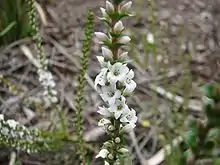| Epacris gunnii | |
|---|---|
 | |
| In Royal Botanic Gardens, Cranbourne | |
| Scientific classification | |
| Kingdom: | Plantae |
| Clade: | Tracheophytes |
| Clade: | Angiosperms |
| Clade: | Eudicots |
| Clade: | Asterids |
| Order: | Ericales |
| Family: | Ericaceae |
| Genus: | Epacris |
| Species: | E. gunnii |
| Binomial name | |
| Epacris gunnii | |
| Synonyms[1] | |
|
Epacris microphylla var. gunnii (Hook.f.) Benth. | |
Epacris gunnii is a species of flowering plant in the family Ericaceae and is endemic to south-eastern Australia. It is an erect shrub with hairy branchlets, concave, sharply-pointed, broadly egg-shaped leaves, and tube-shaped, white flowers arranged along the stems.
Description
Epacris gunnii is a shrub with a few slender erect branches typically growing to a height of up to about 1 m (3 ft 3 in), the branches softly-hairy. The leaves are glabrous, concave, broadly egg-shaped, 2.0–6.5 mm (0.079–0.256 in) long, 1.8–5.5 mm (0.071–0.217 in) wide, sharply-pointed and evenly-spaced along the branches. The flowers are arranged along 20–30 cm (7.9–11.8 in) of the branches in leaf axils, each flower on a pedicel about 1 mm (0.039 in) long with up to 21 bracts at the base. The sepals are egg-shaped, 2.2–3.0 mm (0.087–0.118 in) long, the petal tube 1.2–2.0 mm (0.047–0.079 in) long with lobes 1.7–2.7 mm (0.067–0.106 in) long, the anthers slightly longer than the petal tube. Flowering occurs from April to October in New South Wales, from September to December in Tasmania. In Victoria, flowering can occur in any month, but from October to February at higher elevations. The fruit is a capsule 1.4–1.8 mm (0.055–0.071 in) in diameter.[2][3][4][5]
Taxonomy
Epacris gunnii was first formally described in 1847 by Joseph Dalton Hooker in the London Journal of Botany, from specimens collected in the "Marlborough and Hampshire Hills" by Gunn and Lawrence.[6][7]
Distribution and habitat
This epacris grows in forest, heath and grassland, sometime on stream banks and occurs on the coast and tablelands of eastern New South Wales, and mostly in higher places in eastern Victoria and Tasmania. In New South Wales it grows on peaty soils in association with Leptospermum glaucescens, Sprengelia incarnata and Ranunculus species.[2][3][4][5]
References
- 1 2 "Epacris gunnii". Australian Plant Census. Retrieved 30 May 2022.
- 1 2 "Epacris gunnii". PlantNET - New South Wales Flora Online. Royal Botanic Garden Sydney. Retrieved 28 March 2010.
- 1 2 Albrecht, David E. "Epacris gunnii". Royal Botnic Gardens Victoria. Retrieved 30 May 2022.
- 1 2 Wood, Betty. "Epacris gunnii". Lucid Keys. Retrieved 30 May 2022.
- 1 2 Jordan, Greg. "Epacris gunnii". University of Tasmania. Retrieved 30 May 2022.
- ↑ "Epacris gunnii". APNI. Retrieved 30 May 2022.
- ↑ Hooker, Joseph Dalton (1847). "Florae Tasmaniae Spicilegium: or, Contributions towards a Flora of Van Diemen's Land". London Journal of Botany. 6: 272. Retrieved 30 May 2022.